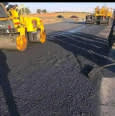Best tarmac & asphalting specialists in Isipingo Beach, KwaZulu-Natal
Top tarmac & asphalting specialists near you
Browse the best tarmac & asphalting experts and compare ratings and reviews.
Hire the best tarmac & asphalting specialist
Search Uptasker for the best tarmac & asphalting specialists
How can a tarmac and asphalting specialist help me?
Both vehicular and foot traffic require smooth surfaces on which to travel, both in order to prolong the use of footwear and tyres, as well as to provide a less hazardous and more comfortable surface on which to walk or drive. Whilst this can be achieved through various methods such as regular grading of natural road surfaces, tiling or paving such areas, these are necessarily time-consuming and expensive options on an on-going basis. For this reason, roads, driveways, pavements, parking areas and airport runways are most often covered with tarmac or asphalt as a cheaper and more durable option for continual wear and tear. Asphalt is also used in various other industries and for completely different purposes, which makes it an extremely versatile construction and surfacing material where its properties can be modified for a variety of uses.
What exactly is asphalt?
The terms asphalt, or bitumen, are often used interchangeably to denote both natural and manufactured forms of the substance. It is a black or brown petroleum-like material whose consistency varies from a viscous liquid to solid. The majority of asphalt used commercially is obtained from petroleum distillation from petroleum crude oil, with asphalt being the heaviest part of the crude after all the volatile, light fractions have been distilled off. However, large amounts were deposited by water and may be found naturally in the mud on the bottom of the ocean or lake from the remains of ancient, microscopic algae which once lived. With exposure to heat above 50°C and the pressure from burial deep in the earth, the remains were gradually transformed into materials such as bitumen, kerogen, or petroleum. Compounds of hydrogen, carbon and minor proportions of nitrogen, sulphur and oxygen make up asphalt. It should be noted that the terms “asphalt” or “bitumen” should not be confused with tar or coal tars. Tar is the thick liquid primarily sourced from vegetation masses, either fossilised (as with coal), or harvested fresh. Typically, asphalt concrete production involves mixing fine and coarse aggregates such as sand, gravel and crushed rock with the asphalt binder. In addition, recycled polymers – for instance, rubber tyres – may be added to the asphalt to further modify its properties for different uses.
What is it asphalt mainly used for?
Asphalt, in various forms, has been used around the world for centuries, and for different purposes. Approximately 102 million tonnes of asphalt is used globally per year, about 85% of which is used as the binding agent in asphalt concrete for roads, airport runways, car parks and pavements. The major portion (around 85%) of refined asphalt is used in the construction and maintenance industries, mainly as a constituent of products used in ground surface and roofing applications, with 70% of this primarily being used for road construction. Approximately 10% of global asphalt production is used for bituminous waterproofing products, where it is highly valued for its waterproofing qualities, and is widely used in the production of roofing felt and for sealing flat roofs. About 5% of asphalt is used for sealing and insulating purposes in a range of building materials such as pipe coatings, carpet tile backing and paint.
It is most commonly used for :
- Highways
- Airport runways
- Footways and pedestrian pavements
- Car parks
- Racetracks
- Tennis courts
- Roofing
- Damp proofing
- Dams
- Reservoir and pool linings
- Soundproofing
- Pipe and cable coatings
- Paints
- Building waterproofing
- Tile underlying waterproofing
- Newspaper ink production
What is tar and how is it used?
Tar itself is a dark brown or black viscous liquid of hydrocarbons and free carbon, obtained from a wide variety of organic materials through destructive distillation. Tar can be produced from coal, wood, petroleum, or peat. Tarmac - short for tarmacadam - comprises a layer of crushed stone or aggregate which is coated and mixed with tar. The resulting mixture is then spread and compacted with a vibrating roller until a smooth surface is formed. Tarmac is strong, durable and weather resistant as well as being extremely resilient to traffic from heavy vehicles, making it an ideal surface for driveways and roads. Because it has a smooth surface, tarmac does not have natural cracks which can fill up when it rains. Tarmac is laid as a hot liquid, then cooled to allow the particles to bind together. Tarmac has the additional advantage of being able to be laid directly onto existing surfaces, making it a more efficient and quicker option than, say, brick paving or tiling.
Asphalt, although similar to tarmac, has fewer external materials and is, as a result, slightly more hard-wearing, durable and long-lasting. Asphalt is a more modern variation in which aggregate is mixed into a bitumen (a byproduct of petroleum distillation) binder rather than the original tar and, as such, is particularly flexible. Asphalt is both an affordable and cost-effective surface for roads and driveways.
Is asphalt better than tarmac?
Although, at first glance, these two mediums seem fairly similar in both composition and usage, there are definite differences between them, such as :
- Tarmac cannot be reused, whilst asphalt can be scraped off the surface, reprocessed and re-used for a different purpose. As such, it is therefore more environmentally friendly than tarmac;
- Asphalt is safer for road-users since it has a smoother surface than tarmac as it uses aggregate with smaller sizes, thereby increasing tyre grip and hold;
- Asphalt is less expensive when used for large areas such as roads, pavements and driveways;
- Tarmac may be more easily damaged by petrol or diesel spills than asphalt.
How to find the right tarmac and asphalting specialist for your needs
Check their online ratings and customer reviews
The internet is a terrific resource when looking for these specialists, as more and more companies are beginning to use this medium in advertising their services. Search engines such as Uptasker are amazing timesavers in this regard. Uptasker itself lists suppliers in geographical locations, making it easier to find a company close to your own area, as well as providing online ratings and customer reviews, if available. The site also provides ‘one-click’ links to websites, which is extremely convenient if you are looking for portfolio pictures and range of services offered. This is also a useful factor if you are looking for different quotes for comparative purposes. You will also find these specialists by looking for articles and advertisements in construction and manufacturing magazines and catalogues, speaking to civil engineers and builders and checking the Yellow Pages. If you are looking for a specialist to do a smallish job such as your driveway at home, check around for word-of-mouth referrals from friends and colleagues.
Top tarmac and asphalting specialist tips

Roads, parking areas, airport runways, pavements and driveways are subjected to a great deal of daily traffic and need to be durable, practical, hard-wearing and provide a high level of surface safety. Asphalt is ideal for this purpose. But don’t think that its uses end there. Because it provides a high degree of water resistance, it is ideal for lining flat-roofed homes, dams, reservoirs, pipes and other applications where water and moisture needs to be kept in – or out. Surprisingly, it is also extremely useful in soundproofing applications. For more tips, see our tarmac and asphalting specialist articles.
Read Tarmac & Asphalting articles
Popular tarmac & asphalting jobs near Isipingo Beach
(job reopened Feb 6, 2024).
(job reopened Feb 6, 2024).






